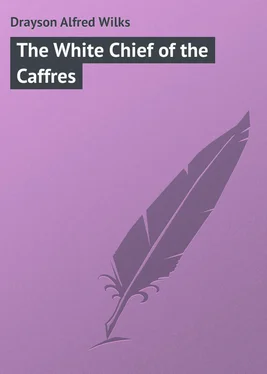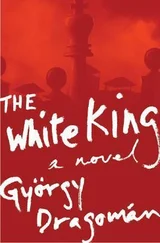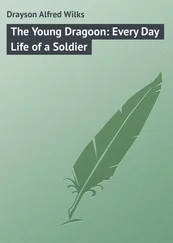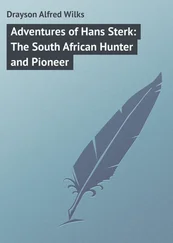Alfred Drayson - The White Chief of the Caffres
Здесь есть возможность читать онлайн «Alfred Drayson - The White Chief of the Caffres» — ознакомительный отрывок электронной книги совершенно бесплатно, а после прочтения отрывка купить полную версию. В некоторых случаях можно слушать аудио, скачать через торрент в формате fb2 и присутствует краткое содержание. Жанр: Прочие приключения, foreign_prose, на английском языке. Описание произведения, (предисловие) а так же отзывы посетителей доступны на портале библиотеки ЛибКат.
- Название:The White Chief of the Caffres
- Автор:
- Жанр:
- Год:неизвестен
- ISBN:нет данных
- Рейтинг книги:4 / 5. Голосов: 1
-
Избранное:Добавить в избранное
- Отзывы:
-
Ваша оценка:
- 80
- 1
- 2
- 3
- 4
- 5
The White Chief of the Caffres: краткое содержание, описание и аннотация
Предлагаем к чтению аннотацию, описание, краткое содержание или предисловие (зависит от того, что написал сам автор книги «The White Chief of the Caffres»). Если вы не нашли необходимую информацию о книге — напишите в комментариях, мы постараемся отыскать её.
The White Chief of the Caffres — читать онлайн ознакомительный отрывок
Ниже представлен текст книги, разбитый по страницам. Система сохранения места последней прочитанной страницы, позволяет с удобством читать онлайн бесплатно книгу «The White Chief of the Caffres», без необходимости каждый раз заново искать на чём Вы остановились. Поставьте закладку, и сможете в любой момент перейти на страницу, на которой закончили чтение.
Интервал:
Закладка:
We passed several kraals on our journey, at most of which the people came out and spoke to us, and every one who saw my necklace at once addressed me as “Inkosana.” At least a dozen times Inyoni gave an account of my leopard-trap, and how we had killed this leopard, and I found myself looked at with envy by the boys and admiration by the girls, whilst both were very friendly, and usually walked with me for some distance on the journey.
The sun was several times its own diameter above the horizon when we reached a kraal in which, so Inyoni told me, one white woman was living. I entered this kraal, and Inyoni telling the head man that the chief had allowed me to come to visit the white woman, I was shown a hut and told I might go in. On entering this hut I saw Constance, who at once caught me in her arms and kissed me, expressing great delight at seeing me, as she feared I had been killed. I soon told her all that had happened to me, and that I was well-treated and not very unhappy. She listened to all I had to say, and told me she was very glad to hear so good an account, but that she was utterly miserable and wished she were dead. I tried to cheer her by giving her hopes of a better future, but she assured me it was impossible that we should ever see our friends again, and that if she did not marry one of the chief’s sons they intended to kill her. We sat talking the greater part of the night, and the next morning went for a walk, the Caffres appearing to take no notice of us, though I could see one or two boys go on the hill-tops and sit down, evidently to watch us. We sat down under the shade of some euphorbia trees and talked over our prospects. Constance could tell me nothing of Mrs Apton or her daughter; they had been taken away to some distant kraal, and for a long time I heard nothing of them. I passed the whole of my time with Constance, and promised to come and see her again; then, bidding her good-bye, I started at daybreak on my return to my own kraal.
Although I was living among a race of black people who would be deemed savages, and who had slaughtered my companions who had been shipwrecked on the coast, still I felt a sort of home-feeling on rejoining my kraal and on meeting Inyati again after only three days’ absence. Now that I knew about the male passengers and sailors having been assagied, I talked to several of the young Caffres about it; and their remarks were so sensible, and seemed to me so reasonable, that I must here repeat them.
They said that only twice had white men come on their coast. The first men who came made signs of friendship, and were well received. They stayed two days on shore, and then enticed several young men and maidens to go with them to the shore, where they captured them and carried them to their ship. Resistance was of course offered by the men, and several were shot, also two females were shot. On hearing of this treachery, all the chiefs along the coast met in council, and agreed that, if any more white men came to the coast, the people were to retreat, and a watch was to be set on the white men, and they were to be surprised and assagied before they could shoot anybody. Seeing our shipwrecked men on the coast, the Caffres concluded that we had come on an expedition similar to that of the former visitors, and so they had attacked us. They admitted that when they found there were women among the party they hesitated, but having received the chief’s orders to attack us, they had no choice but to obey. “Now,” they said, “we must keep you always, for if you went back among white people, you would tell them we had killed your companions, and then an army of white men would come and attack us.”
There was no doubt it was by a mistake that my fellow-voyagers had been killed, but when I heard the Caffres’ explanation I could not think them very wrong. We, in fact, had suffered for the sins of some slave-hunters, who might or might not have been English.
I explained to the Caffres how we had been shipwrecked and had escaped on rafts, and how they would have received presents had they been kind to us, and had they forwarded us to the nearest English or Dutch town. They admitted that such might have been the case, but now, having killed the white men, they said they must keep the thing quiet. I told them, that even now, if they forwarded me and the three ladies to the Cape Colony, they would be rewarded; but they shook their heads and said, “When you go among your own people you could not help telling them we had assagied your people, then an army come here and kill us. No, we keep quiet.” It was useless my assuring them that I would not tell any of my people that the men had been assagied. The Caffres smiled and replied, “You don’t know yourself. Now you believe you not tell, but when with your own people you could not help telling. Don’t think of going away – that never be. You will by-and-by be Caffre Chief here.”
All these conversations were of course carried on in the Caffre language, and I have endeavoured to give as nearly as possible the meaning in English of the various words. In consequence of hearing nothing but Caffre spoken, and also having to express all my meaning in the same language, I could now speak it as well as the Caffres themselves, and so was able to learn all the views that the Caffres had on various matters. In thinking over in after-life these days of my early experiences, I have come to the conclusion that these people were a strange mixture of common sense, very acute perceptions, and also very childish in many things. As regards what we term science they were of course completely ignorant, so much so, that, child as I was, I knew more than they did. For example, a great argument had been going on in our village once during several evenings. I had heard in my hut some of the words, and distinguished the word inyanga used very often, this word being used to signify the moon, and also a month. A Caffre counts his age as so many moons. Thus a Caffre boy who was one hundred and twenty moons old would be nearly twelve years of age, and if he lived to be nine hundred and thirty moons old, he would be about seventy years. I have since wondered whether this was the way that the people in the East formerly counted their ages, and were therefore said to live to nine hundred years of age. For if, as it has been suggested by some modern explainers, this great age was given to the ancients in order that they might people the world, it seems that they sadly neglected their duty. For Methuselah lived one hundred and eighty-seven years before he devoted himself to this duty, and Lamech lived also one hundred and eighty-two years before he had a son. A Caffre who was one hundred and eighty-two moons old would be about fourteen years old, and as these people come to maturity very quickly he would be quite a young man.
After several long arguments the men at length appealed to me, and the question was this: – “Is it the same moon that comes each month, gradually grows larger, and then gets small again? or is it a fresh moon that is born each month, gets full-grown, and then dies?”
I told them it was the same moon, and they then asked me for proof, which I was quite unable to give; and so, although my statement was considered of some value, yet it did not convince the opponents of the theory about a different moon. They argued the subject during several evenings, and at the end of the discussion the result was not very dissimilar to that which occurs among a certain type of scientific men: each party remained of the same opinion with which he commenced the inquiry. From what I could learn, I found that those who asserted that it was a fresh moon born every month, had the best of the argument, and seemed to be most reasonable. There was, however, a peculiarity about these arguments which I always thought of in after years when I could compare them with the discussions and arguments in the civilised world on various questions. The Caffres always seemed to desire truth, and to argue for the purpose of eliciting it. They would admit the soundness of an opponent’s reasons, and sometimes allow that these could not be answered. They never indicated that their object was to prove themselves right and their opponents wrong, no matter what was the result.
Читать дальшеИнтервал:
Закладка:
Похожие книги на «The White Chief of the Caffres»
Представляем Вашему вниманию похожие книги на «The White Chief of the Caffres» списком для выбора. Мы отобрали схожую по названию и смыслу литературу в надежде предоставить читателям больше вариантов отыскать новые, интересные, ещё непрочитанные произведения.
Обсуждение, отзывы о книге «The White Chief of the Caffres» и просто собственные мнения читателей. Оставьте ваши комментарии, напишите, что Вы думаете о произведении, его смысле или главных героях. Укажите что конкретно понравилось, а что нет, и почему Вы так считаете.












